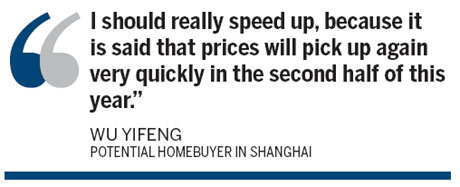
This is reminiscent of 2009, when prices doubled in several months after Beijing rolled out a 4-trillion-yuan stimulus package, the newspaper said.
Bad memories have already made some homebuyers increasingly impatient. Wu Yifeng, a 30-year-old marketing specialist in Shanghai, is one of them.
Wu said he started to search for his first apartment in May.
|
 |
Since then, he had been frequently told that it would be best to buy an apartment in the first half of this year, as prices are at a "historic low". He said he currently has two properties in mind, priced between 28,000 yuan and 31,000 yuan per sq m.
"I should really speed up, because it is said that prices will pick up again very quickly in the second half of this year," he said.
Wu has reasons to worry.
A property in Jiading New City in northern Shanghai was sold for 13,000 yuan per sq m in December, and is now worth 14,500 yuan per sq m.
Another property in northern Shanghai's Nanxiang county saw its price rise from 14,000 yuan per sq m at the end of last year to the current level of 15,200 yuan.
Forward delivery housing prices also rose. Of the 76 projects in this sector, 21 projects, or 28 percent, closed at a higher price, according to Homelink Real Estate.
But given the two distinct markets mentioned above, Xue predicted that the National Bureau of Statistics' index will still go down in June and possibly July, while specific properties will see their prices rise as the market in Shanghai is about to bounce back.
Li Pinke, an analyst with Guotai Junan Securities, said first-tier cities may see slow growth, given limited supply and vigorous demand. But in second- and third-tier cities, high inventories will cap a quick rebound in home prices in the short term.
Li Shaoming, an analyst with China Investment Securities, agreed that house prices will see gradual recovery in the second half of this year. But a surge is less likely.
However, striking a balance between spurring real demand and preventing a price surge, a possible product of rush buying amid expectations of a price surge, poses a challenge to the authorities, according to analysts.
Beijing had earlier encouraged banks to offer lower mortgage rates to first-time buyers, and tolerated certain moves by some local governments to loosen real estate restrictions.
But with increasing cases of local loosening and surging sales, Beijing has started to show signs of caution, warning local government not to cross its "red line".
In early June, the Ministry of Housing and Urban-Rural Development denied domestic media reports claiming that the government was planning to loosen its real estate policy, emphasizing that policies targeting real estate speculation and price inflation would remain in place.
"On the one hand, we should continue credit and tax support for first-time homebuyers. On the other hand, various measures should be consolidated to curb speculative and investment demand," a ministry spokesman said.
Contact the writers at zhengyangpeng@chinadaily.com.cn and shijing@chinadaily.com.cn







